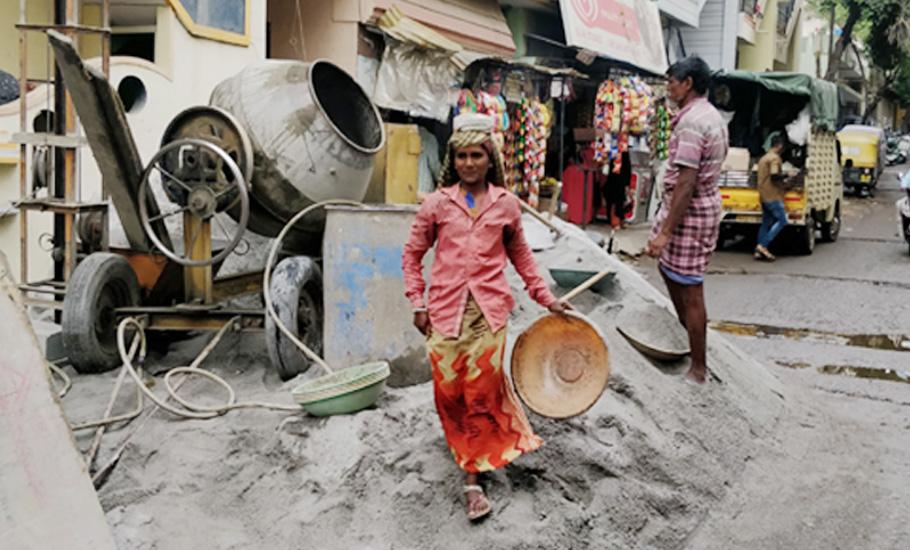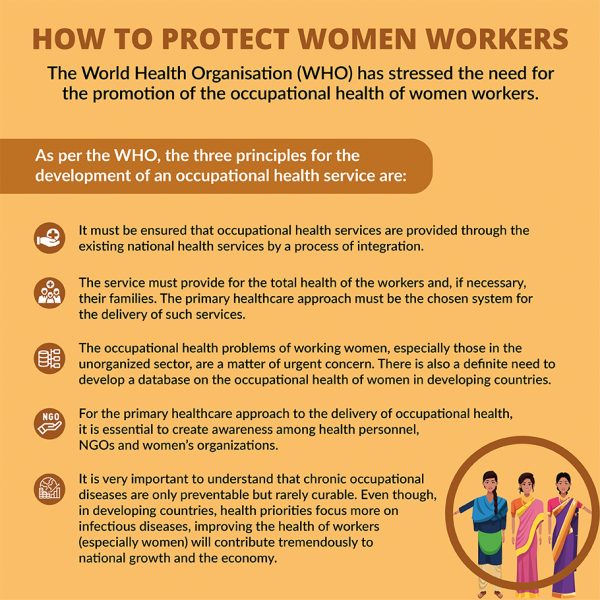
- Home
- News
- Analysis
- States
- Perspective
- Videos
- Education
- Entertainment
- Elections
- World Cup 2023
- Features
- Health
- Business
- Series
- Economy Series
- Earth Day
- Kashmir’s Frozen Turbulence
- India@75
- The legend of Ramjanmabhoomi
- Liberalisation@30
- How to tame a dragon
- Celebrating biodiversity
- Farm Matters
- 50 days of solitude
- Bringing Migrants Home
- Budget 2020
- Jharkhand Votes
- The Federal Investigates
- The Federal Impact
- Vanishing Sand
- Gandhi @ 150
- Andhra Today
- Field report
- Operation Gulmarg
- Pandemic @1 Mn in India
- The Federal Year-End
- The Zero Year
- Premium
- Science
- Brand studio
- Home
- NewsNews
- Analysis
- StatesStates
- PerspectivePerspective
- VideosVideos
- Entertainment
- ElectionsElections
- Sports
- Loading...
Sports - Features
- BusinessBusiness
- Premium
- Loading...
Premium

How most women are paying with health at their jobs

At 64, Sarojamma (who goes by her first name only), a resident of Arundathi Nagar slum in Bengaluru, is in dire need of a job. In her twilight years, Sarojamma, like her peers, wants to have a “stable, secure and peaceful retired life”. But her “poor health and equally poor finances” have forced the former construction worker to look for a less-gruelling job. For a few years, she...
At 64, Sarojamma (who goes by her first name only), a resident of Arundathi Nagar slum in Bengaluru, is in dire need of a job. In her twilight years, Sarojamma, like her peers, wants to have a “stable, secure and peaceful retired life”.
But her “poor health and equally poor finances” have forced the former construction worker to look for a less-gruelling job. For a few years, she was working as a domestic help but lost her job during the pandemic. Recalling her days as a construction worker, Sarojamma, sitting at the porch of her one-room home, tells The Federal that “it was both a boon and a bane”.
“I worked at various construction sites across Bengaluru for almost three decades. I started working when I was 25 and worked till my mid-fifties. It was never an easy job, but money was good compared to other work.” The long hours of work — sometimes for months at a stretch without a break — left Sarojamma with “severe back pain”. Today, she walks with a stoop. “I was a brick-breaker and weight carrier. Most women, who worked with me developed back pain. Some are bedridden now.”
Sarojamma’s husband at 74 depends on his wife for all his needs. The couple does not have any children. “I have no one to support me. I need a job. I know I am old and weak but I have no other option,” she says raising her hands towards the sky.
The story of the 64-year-old highlights the occupational health hazards faced by the female workforce. Women workers are, again, divided into blue-collar and white-collar, rural and urban, educated and uneducated, skilled and unskilled, and paid and unpaid.
Women workers in the unorganised sector are usually the worst off when it comes to occupational diseases and hazards. They are the ones who face various macro and micronutrient deficiencies too.
How safe and healthy are workplaces for women?
The female workforce in brick kiln and beedi industries, for example, are prone to iron deficiency and often become anaemic. Anaemia is a major health concern among Indian women, especially those from vulnerable groups. The Union health ministry’s latest National Family Health Survey findings — released in November 2021 — too raised concern over the prevalence of anaemia among women and children.

A 2019 research work, ‘Health and Safety of Women Workers in Informal Sector: Evidences from Construction and Beedi Rolling Works in India,’ found that “among the female workforce, there is a higher prevalence and incidence of occupational diseases particularly respiratory, dermatological, musculoskeletal, heat stroke, dehydration and psychological stress.”
The paper by Sigamani Panneer from the Central University of Tamil Nadu stated, “Ninety-one per cent of the total workforce and 95 per cent of the female workforce in India are employed in the informal economy and characterized by lower earnings with no upward mobility.” “The undernourishment of women and infants, incidence of poor maternal and child health has been attributed to the lack of adequate social security measures and welfare benefits (e.g., maternity leave) to the female workers in the informal sector.”
Speaking to The Federal, Dr Bobby Joseph, professor of community health and head of occupational health services, St John’s Medical College, Bengaluru, stressed the need to implement the Occupational Safety, Health and Working Conditions Code, 2020 — or the OSH Code — to ensure better health and safety measures for women workers. Although the OSH Code was passed by Parliament and received the President’s assent in September 2020, states are yet to implement it.
Different problems
Dr Joseph, who has extensively researched and written on women, occupation and health, said health hazards and diseases faced by women workers depend on their professions too. For example, the health issues faced by female agricultural workers are different from those women techies have to deal with.
The research work ‘Occupational Health of Agricultural Women Workers in India’, published by the US-based National Library of Medicine in 2020, says that the female workforce in the sector is prone to both occupational diseases and hazards.
Researchers J Raja Meenakshi and Sigamani Panneer found that agricultural women workers in the country face health problems (like musculoskeletal disorders, gynaecological and menstrual issues and asthma), physical hazards (like heat and humidity), chemical risks (like fungicide and insecticide) and psychological issues (like lack of sleep and stress).
Experts say musculoskeletal disorders and gynaecological and menstrual health issues are some of the common health problems among female workers. But, unlike agricultural workers, IT professionals do not do strenuous physical labour and are not exposed to hazardous chemicals.
“Musculoskeletal disorders and menstrual problems like irregular periods to heavy bleeding (especially among young women) are the common health issues faced by the female workforce in the country,” said Dr Joseph. He clarified that the health issues faced by women workers are not necessarily attributable to the nature of their profession.
“Because of long working hours (both at homes and workplaces) women develop body aches, sprains and strains,” said Dr Joseph. “Long sitting or standing hours at work affect their postures and they develop ergonomic problems. They are also prone to stress, fatigue and mental health issues. The environmental factors (like the quality of air, dust level, etc.) of a working place also impact the workers’ health.”

The health and safety of women workers have never been a priority in the country. India’s female workforce participation rate is the lowest in the world — it fell from 21 per cent to 16 per cent after the pandemic, according to World Bank data — and is rapidly shrinking.
At the global level too, the female workforce participation rate is not very encouraging. According to the International Labour Organisation (ILO), the current global labour force participation rate for women is just under 47 per cent compared with 72 per cent for men.
As of 2021, there were 3,970 million males worldwide (50.42 per cent of the overall population). The number of females is estimated at 3,905 million (49.58 per cent of the world population), according to United Nations World Population Prospects 2019.
Why is work not the same for men and women
According to the ILO, two-thirds of the working hours around the world are worked by women because of the combination of various roles in the workplace, in the family and in society. Most often, women’s work remains invisible, but it contributes a major portion to the world economy.
A 2015 paper, ‘Female Workers and Occupational Health Problems’, by Worksafe Iowa, a multidisciplinary outreach programme within the University of Iowa’s College of Public Health in the US, said that women face different workplace health challenges than men, partly because men and women tend to have different kinds of jobs.
“Women generally have more work-related cases of carpal tunnel syndrome, tendonitis, respiratory diseases, infectious and parasitic diseases, and anxiety and stress disorders. Social, economic, and cultural factors also put women at risk for injury and illness,” said the paper.
Dr Ramya SR, chief medical officer, urban primary health centre, Kumbarakoppal, Mysuru, Karnataka told The Federal it is never easy for women. “All women work,” she said. “Some are paid and some not. The women who go out to work and earn, struggle a lot while balancing their work and family. They go through stress, burnout and depression.”
Dr Ramya, who herself works six days a week attending to at least 40 patients each day, practises yoga, eats food on time and tries to be kind to others. “This is my coping mechanism,” she said with a smile.
Dr Archana Verma, former vice-president of the Federation of Obstetric and Gynaecological Societies of India (FOGSI), says the problems of women workers are multi-layered, especially in a country like India where women’s roles are usually defined in the realms of childbearing, childcare and household chores. “Be it an educated woman working in the corporate sector or a construction worker, she has to juggle a lot. It takes a toll on the person.” In her career of three decades, Dr Verma, says she has often met working expectant mothers with illnesses such as tuberculosis, postural and eye problems, and nutritional deficiencies.
Meanwhile, at her nursing home in Ghaziabad, Dr Verma is often heard telling her female colleagues and patients to make their health a priority. “Every woman must take care of her health and well-being. Be kind to yourself and your fellow women. We need each other the most.”

